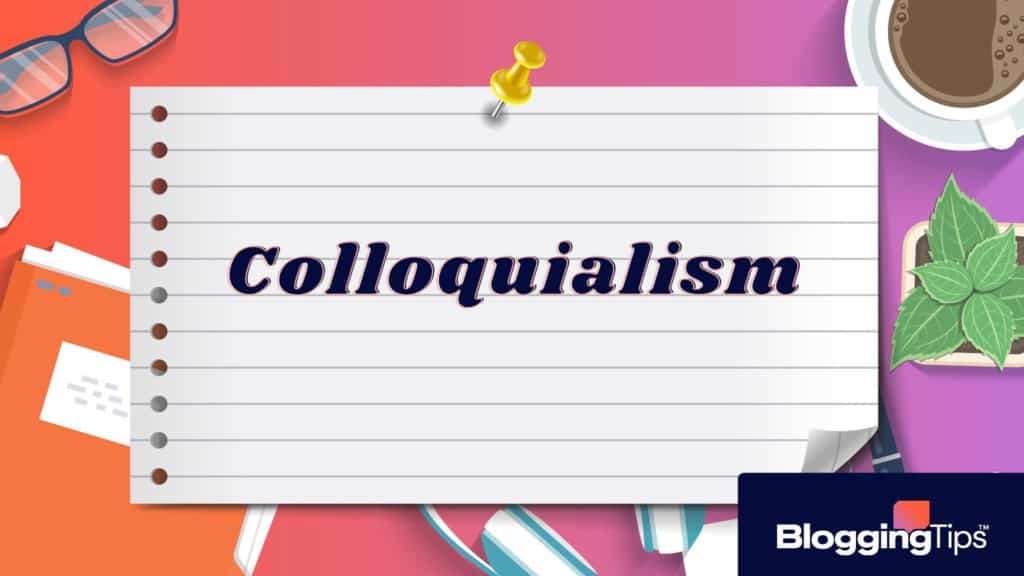A colloquialism is one of the great literary devices to help make writing more engaging for readers and give your writing more personality.
Read on to learn about colloquial language, including different types, examples, and how to identify and use colloquialisms, as well as information on other literary devices to help take your writing to the next level.
- What Is Colloquialism?
- Why Is Colloquialism Used?
- Types of Colloquialisms
- How Do You Identify a Colloquialism?
- How Do You Use a Colloquialism in a Sentence?
- What Is the Most Popular Example of a Colloquialism?
- Other Modern Examples of Colloquialisms
- Notable Writers Who Used Colloquialisms
- What Is the Opposite of Colloquialism?
- Other Related Literary Devices To Know
- Frequently Asked Questions
- Wrapping Up
What Is Colloquialism?
A colloquialism refers to an informal and often non-literal expression.
Also Known As:
- Colloquial language
- Everyday language
- Common parlance
Simple Definition: How To Explain a Colloquialism to a Child
Take a common saying and include the formal version for a simple explanation.
For example, “Hey. What’s up?” is a colloquialism; the formal version would be “Hello. What are you doing?”
Why Is Colloquialism Used?
Colloquialisms are used in writing to show personality, make characters more genuine, and make writing accessible.
Colloquial language can also give readers a better idea of the author’s or character’s background, social status, level of education, etc.
Types of Colloquialisms
There are many different types of colloquialisms. Below are a few examples.
- Aphorisms: An aphorism is a short and memorable saying that expresses wisdom or an opinion using everyday language. An example of an aphorism is, “Easy come, easy go.”
- Idiomatic Expressions: Idiomatic expressions, often shortened to idioms, are words or phrases with a figurative meaning that native speakers understand. For example, “Don’t beat around the bush.”
- Profanities: Profanities are typically called swear or curse words and refer to obscene language. However, profane language isn’t only swearing; it can also be dirty jokes or racially insensitive remarks.
- Proverbs: A proverb is a brief, succinct expression used to convey wisdom or advice. For example, “A bird in the hand is worth two in the bush.”
- Regional Terms and Phrases: Regional terms and phrases are words and expressions used in specific regions. For instance, the word “janky” is used in the Northeastern states to describe something of poor quality.
How Do You Identify a Colloquialism?
Since colloquial language is used in everyday situations, it may be hard to spot.
However, if you travel to a different region and hear a word or phrase used that you understand as the language you speak but cannot grasp the meaning of, then it’s likely a colloquialism.
How Do You Use a Colloquialism in a Sentence?
Since there are different types of colloquialisms, you can use them in a sentence in various ways.
You can use a colloquial word to describe something, such as referring to a song as “cool.”
Or you could use a colloquial phrase to offer advice, such as telling your heartbroken best friend, “There are plenty of fish in the sea.”
What Is the Most Popular Example of a Colloquialism?
The most popular example of a colloquialism would be a descriptive word, such as “kind of.”
When you say, “A kiwi kind of tastes like a mix of strawberry, banana, and pineapple,” the “kind of” means “similar to” in formal language.
Other Famous Examples of Colloquialisms
- Loads/tons: Very much/numerous amounts.
- Hit the hay: Go to sleep.
- Okay: Acceptable/appropriate.
Other Modern Examples of Colloquialisms
Here are some examples of modern colloquial expressions.
Examples of Colloquialisms for Kids
- Ants in your pants: To be restless or impatient.
- Cross your fingers: To hope for something.
- Use your noodle: To use your brain/to think.
Examples of Colloquialisms in Writing
“When you’re dead, they really fix you up. I hope to hell when I do die somebody has sense enough to just dump me in the river or something.” – J.D. Salinger, The Catcher in the Rye.
There are several examples of colloquial language here.
“Fix you up” means spending a lot of time and money to make you look nice.
“Hope to hell” means to hope strongly. “Sense enough” means adequate intellect.
“Just dump” means simply putting the body in a river.
And “something” means an alternative, similar plan.
“Thing is, as ye git aulder, this character-deficiency gig becomes mair sapping. Thir wis a time ah used tae say tae aw the teachers, bosses, dole punters, poll-tax guys, magistrates, when they telt me ah was deficient.” – Irvine Walsh, Trainspotting.
Here, Walsh is writing colloquially to reflect that the character is Scottish.
To non-Scottish readers, it may take time to get into the flow of the writing and understand what is being said.
“What’s the use you learning to do right, when it’s troublesome to do right and it ain’t no trouble to do wrong, and the wages is just the same?” – Mark Twain, The Adventures of Huckleberry Finn.
Like Walsh, Twain uses colloquial language to express that the character is from a particular southern region and also points toward the fact that he is poorly educated and from a lower economic background.
Examples of Colloquialisms in Songs
“I used to bite my tongue and hold my breath / Scared to rock the boat and make a mess.” – ”Katy Perry, “Roar.”
Colloquialisms abound in this song. In the first two lines, there are four examples.
“Bite my tongue” and “hold my breath” mean to hold back from saying what she wants to say, while “rock the boat” and “make a mess” means to create conflict.
“I can care less what you think / I need no permission, did I mention / Don’t pay him any attention.” – Beyonce, “Single Ladies.”
The phrase “I can care less” means that you don’t find something important at all.
The colloquial phrase in other English-speaking regions and countries is “I couldn’t care less,” which seems to make more sense.
This is a hotly debated colloquialism.
The other colloquialisms here are “need no,” meaning do not need, and “pay,” meaning give.
“When your legs don’t work like they used to before / And I can’t sweep you off of your feet” – Ed Sheeran, “Thinking Out Loud.”
Sweeping someone off of their feet is a common colloquial phrase used to describe doing something so impressive and romantic that it makes someone fall in love.
Interestingly, the phrase “fall in love” is also a colloquialism, as it describes beginning to develop a romantic attachment for someone.
Notable Writers Who Used Colloquialisms
Writers worldwide use colloquialisms to make their writing and characters more authentic.
Here are a few notable examples.
Anthony Burgess
Anthony Burgess was an English writer and literary critic.
He’s recognized chiefly for his dystopian novel, A Clockwork Orange.
If you begin reading A Clockwork Orange without prior knowledge of the novel, you might think it’s written in another language.
That’s because it sort of was! Burgess refers to the language as Nadsat.
There are even dictionaries available to help readers decipher what the characters are saying.
J.R.R Tolkien
J.R.R Tolkien was an English writer and philologist.
The Lord of the Rings is known for containing many wise proverbs spoken by his Middle-Earth characters.
For instance, “Yet oft in lies truth is hidden,” is Middle-Earth for the English proverb, “Many a true word is spoken in jest.”
Both mean people don’t always mean what they say.
James Joyce
James Joyce was an Irish novelist, poet, and literary critic.
He’s famous for inventing words to describe things in his novels.
For example, he reworked the phrase “to botch up” to describe something that’s a total mess.
We now use the word “botch” to describe a job poorly done.
What Is the Opposite of Colloquialism?
The opposite of colloquialism is formal language.
People use formal language to appear more professional or knowledgeable about a topic.
Colloquialism vs. Formal Language
The best way to compare colloquialisms with formal language is to take a sentence and think about the way it sounds in two different scenarios.
Imagine you can’t attend an engagement due to bad weather and have to cancel.
You might say, “I’m sorry, but I can’t make it because of this lousy weather.”
Now, imagine a theater having to cancel a show for the same reason.
They might send an email saying something like, “We regret to inform you that tonight’s production has been canceled due to adverse weather conditions.”
Both sentences mean roughly the same thing.
However, it’s socially acceptable to use colloquial language when speaking with a friend and formal language when speaking to people you don’t know well, customers, clients, and so on.
Other Related Literary Devices To Know
Here are some other literary devices that you should know.
- Satire: Satire is the use of humor to ridicule, embarrass, humble, or discredit something or someone. Some famous examples of satire are the late-night talk show The Colbert Report or the online newspaper The Onion.
- Paradox: A paradox is a statement that presents a contradiction that may be true. An example of a paradox is the phrase, “You have to spend money to make money.”
- Analogy: An analogy compares two things for explanation or clarification. An example of an analogy is the phrase, “You’re as blind as a bat.”
- Euphemism: A euphemism is using another word instead of a word that’s too blunt or profane. For example, referring to layoffs as “downsizing” or referring to sexual intercourse as “getting lucky.”
- Humor: In writing, humor refers to something written to be amusing or comical. There are many types of humor, including irony, sarcasm, self-deprecation, and so on.
Frequently Asked Questions
Here are a few common questions about colloquialisms.
Is colloquialism the same as an idiom?
Yes. Idiomatic phrases are a type of colloquialism, and the word “idiom” is short for an idiomatic phrase.
Funnily enough, the word “idiom” is a colloquialism in itself, as it is a more informal way to describe a formal literary device.
Why do people use colloquialisms?
People use colloquialisms automatically most of the time.
Growing up in a certain region, socioeconomic status, or cultural background will influence the way you speak.
Likewise, belonging to certain cliques or groups of people will change the way you speak as well.
Wrapping Up
Colloquialisms are one of the more accessible literary devices since most people use them when speaking every day.
So if you’re looking to unlock more topics to write about, you can use colloquial language for inspiration to craft your next character or influence the tone of your next post.
Since they’re so interesting and relevant to a large audience, you could even start a blog on colloquialisms.
As they say colloquially, the sky’s the limit!






